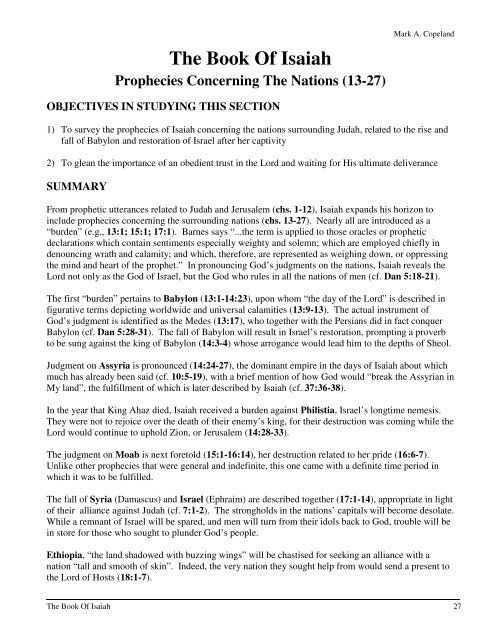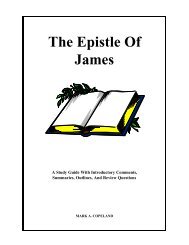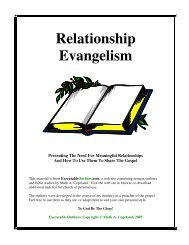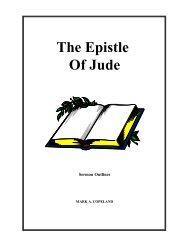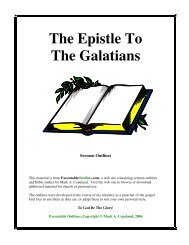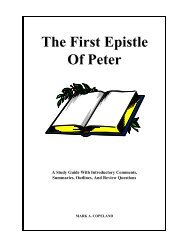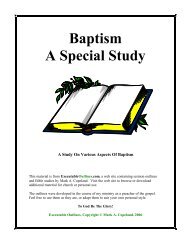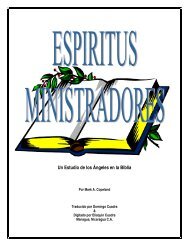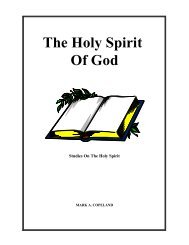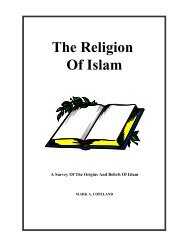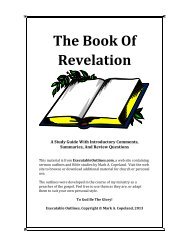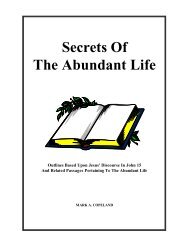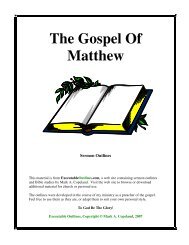The Book Of Isaiah - Executable Outlines
The Book Of Isaiah - Executable Outlines
The Book Of Isaiah - Executable Outlines
- No tags were found...
You also want an ePaper? Increase the reach of your titles
YUMPU automatically turns print PDFs into web optimized ePapers that Google loves.
<strong>The</strong> <strong>Book</strong> <strong>Of</strong> <strong>Isaiah</strong>Prophecies Concerning <strong>The</strong> Nations (13-27)Mark A. CopelandOBJECTIVES IN STUDYING THIS SECTION1) To survey the prophecies of <strong>Isaiah</strong> concerning the nations surrounding Judah, related to the rise andfall of Babylon and restoration of Israel after her captivity2) To glean the importance of an obedient trust in the Lord and waiting for His ultimate deliveranceSUMMARYFrom prophetic utterances related to Judah and Jerusalem (chs. 1-12), <strong>Isaiah</strong> expands his horizon toinclude prophecies concerning the surrounding nations (chs. 13-27). Nearly all are introduced as a“burden” (e.g., 13:1; 15:1; 17:1). Barnes says “...the term is applied to those oracles or propheticdeclarations which contain sentiments especially weighty and solemn; which are employed chiefly indenouncing wrath and calamity; and which, therefore, are represented as weighing down, or oppressingthe mind and heart of the prophet.” In pronouncing God’s judgments on the nations, <strong>Isaiah</strong> reveals theLord not only as the God of Israel, but the God who rules in all the nations of men (cf. Dan 5:18-21).<strong>The</strong> first “burden” pertains to Babylon (13:1-14:23), upon whom “the day of the Lord” is described infigurative terms depicting worldwide and universal calamities (13:9-13). <strong>The</strong> actual instrument ofGod’s judgment is identified as the Medes (13:17), who together with the Persians did in fact conquerBabylon (cf. Dan 5:28-31). <strong>The</strong> fall of Babylon will result in Israel’s restoration, prompting a proverbto be sung against the king of Babylon (14:3-4) whose arrogance would lead him to the depths of Sheol.Judgment on Assyria is pronounced (14:24-27), the dominant empire in the days of <strong>Isaiah</strong> about whichmuch has already been said (cf. 10:5-19), with a brief mention of how God would “break the Assyrian inMy land”, the fulfillment of which is later described by <strong>Isaiah</strong> (cf. 37:36-38).In the year that King Ahaz died, <strong>Isaiah</strong> received a burden against Philistia, Israel’s longtime nemesis.<strong>The</strong>y were not to rejoice over the death of their enemy’s king, for their destruction was coming while theLord would continue to uphold Zion, or Jerusalem (14:28-33).<strong>The</strong> judgment on Moab is next foretold (15:1-16:14), her destruction related to her pride (16:6-7).Unlike other prophecies that were general and indefinite, this one came with a definite time period inwhich it was to be fulfilled.<strong>The</strong> fall of Syria (Damascus) and Israel (Ephraim) are described together (17:1-14), appropriate in lightof their alliance against Judah (cf. 7:1-2). <strong>The</strong> strongholds in the nations’ capitals will become desolate.While a remnant of Israel will be spared, and men will turn from their idols back to God, trouble will bein store for those who sought to plunder God’s people.Ethiopia, “the land shadowed with buzzing wings” will be chastised for seeking an alliance with anation “tall and smooth of skin”. Indeed, the very nation they sought help from would send a present tothe Lord of Hosts (18:1-7).<strong>The</strong> <strong>Book</strong> <strong>Of</strong> <strong>Isaiah</strong> 27


